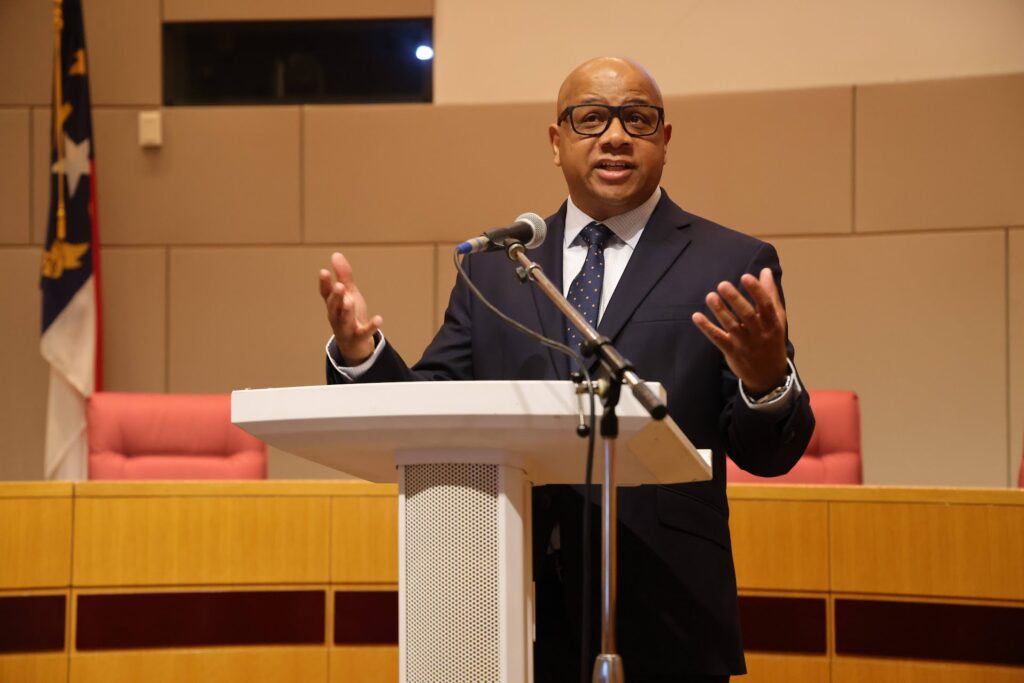Charlotte Initiative Aims To Be A National Model In Supplying City Contracts To Black Businesses
Within the next two years, the Charlotte Business Inclusion wants to become a national model for dispensing city contracts.

The Charlotte Business INClusion program has an ambitious goal: Within the next two years, it aims to become a national model for dispensing city contracts.
The government-backed initiative in North Carolina’s largest city is allying with small, minority, and women-owned businesses (MWSBEs). In 2023, the city distributed $193 million in city contracts with those firms, up 23% from 2022 and 45% from 2021. The contract spending with those businesses for this year has not been released.
The CBI activity comes as many states have recently ended or curbed diversity and inclusion programs at institutions such as the government, colleges, and businesses.
Research shows that closing racial gaps in business ownership could potentially add up to $5 trillion to the U.S. economy over the next five years. Cities nationwide are striving for more inclusive economies.
CBI is a key part of Charlotte’s ecosystem, empowered by City Manager Marcus Jones. Its work includes identifying, communicating, and connecting with certified Minority Business Enterprises (MBEs) to help them obtain projects. CBI currently contracts with about 560 businesses, including MWSBEs and Black entrepreneurs. It hopes to boost that to 640 by next year.
Steven Coker, Charlotte’s business inclusion officer, stated, “By embedding our efforts within the city’s operational framework, CBI serves as a critical bridge between municipal resources and Charlotte’s diverse business community.”
Coker says CBI differentiates itself from similar programs in other cities in many ways. For instance, CBI utilizes 12 staff members and more than 35 liaisons in over 20 city departments to help ensure seamless integration of inclusion goals across all municipal functions.
Other efforts include offering a Contractor Development Program to support surety bonding readiness. Regular disparity studies and economic impact analyses allow CBI to identify gaps, measure success accountability, and refine strategies. Coker declared that other cities intending to foster economic equity could draw inspiration from CBI’s approach.
“These combined efforts create a nationally recognized model of inclusivity, positioning Charlotte as a leader in supplier diversity and economic equity,” Coker says.
Coker provided examples of CBI-certified Black-owned businesses that have secured contracts. One was DA Everett Construction Group, a 20% partnership with Turner Construction on the $215 million renovation of the Charlotte Hornets’ Spectrum Center arena. Another is McFarland Construction, which secured a 20% partnership with JE Dunn Construction to build a $20 million-plus fire station.
Conversely, CBI’s top challenge is increasing the capacity and resources it provides MBEs to support their growth. Coker says CBI hopes to overcome that hurdle by starting new efforts like CBI University next February. It is a collection of programs offering technical support and educational resources to MBEs and other programs.
In May 2024, Charlotte launched a $40 million growth fund to offer financing for MBEs. Coker says the fund addresses access to affordable financing, one of the largest barriers these firms face.
He says the fund aims to provide 2,000 loans up to $250K during the next four years. The loans will be administered by six Community Development Financial Institution fund partners. He stressed that the fund will help businesses scale operations and pursue larger contracts.
As 2025 approaches, Coker says Black-owned firms should contact him or any CBI member here and visit this site to help boost their chances of securing contracts next year. Coker suggests businesses leverage the Contractor Development Program to gain the technical skills, mentorship, and support needed to enhance competitiveness.
Coker added, “To every MWSBE business interested in working with the City of Charlotte, my message is simple: we are open for business and here to help you unlock the doors to opportunity.”
RELATED CONTENT: Aretha Franklin’s Old Detroit Home Restored After $2M Investment












